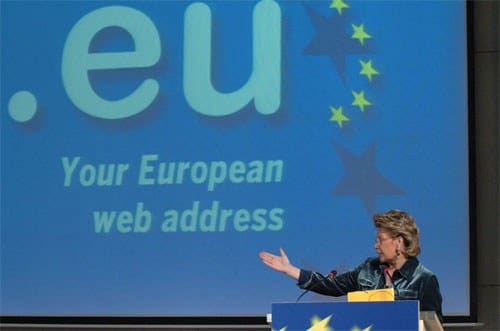
CARDIFF, Wales – Europe must reboot its fledgling domain name to avoid a system crash, critics say, after alleged missteps allowed cybersquatters to stockpile trademarks for auction.
The .eu suffix became the web’s eighth most popular when it went online last year as part of a European Union effort to promote a pan-continental online identity across the 25-nation bloc.
But many who tried and failed to grab their company or trade name say a suspect rollout procedure left them domainless and out of pocket, while the agency regulating .eu has been forced to suspend tens of thousands of domains after discovering 400 of its authorized resellers were phantom companies, created on paper by a handful of registrars to harvest the best names for profit.
Now EURid, the Belgium-based nonprofit charged with operating the .eu space, is facing accusations that it allowed sharks and speculators to rig Europe’s domain system, and politicians are pressing the executive European Commission to investigate ‘possible fraud and mismanagement’ by the body. A key deadline comes Wednesday, when a member of the European Parliament seeking a formal investigation of the matter is expecting a reply from the EC.
‘It was badly handled from start to finish,’ said John McCormac, who runs an Irish domain monitoring service and whose blog tracks the .eu controversy.
Disquiet began on the morning of Dec. 7, when an initial ‘ sunrise period‘ allowed legitimate European trademark owners, once validated by auditor PricewaterhouseCoopers, an early opportunity to add a .eu name to their collection through accredited domain registrar companies, each of which was allowed to request a name from EURid’s central server once per second from up to five IP addresses.
Despite offering documentary proof of rights, some customers were frustrated in their attempts and many have taken their complaints to a Czech arbitration court. London designer Nicolas Roope told Wired News he spent 300 pounds and 12 months trying to bag hulger.eu for his trademarked Hulger gadget range before the name was picked up on the open market by a Canadian auction house using a U.K. mailbox.
Last month, after investigations by domain watchers found names bought by hundreds of EURid-validated sellers traced to only a handful of owners, EURid announced it had frozen 74,000 Cyprus-registered .eu sites and was suing three companies, alleging they maliciously created 400 overseas fronts to multiply their chances of vacuuming up attractive monikers. Critics who had warned of the risks say obvious loopholes made the .eu gold rush a scam waiting to happen.
‘The biggest problem was that the screening process to become a registrar was a breeze,’ said Bob Parsons, CEO of Arizona-based GoDaddy, the world’s largest domain registrar, who first raised concerns in April. ‘EURid decided to let any ‘legal entity’ with 10,000 euros sell the .eu domain extension. You and I both know anyone can form a ‘legal entity’ for $50 in the U.S. and, presto, you’re in the game.’
Many of the registrars allegedly formed by the three companies – Ovidio, Fausto and Gabino – shared the same postal address but lacked sites of their own, a curious omission for a domain retailer.
EURid told Wired News 70 percent of rights holders who applied for domains during the sunrise period were successful.
‘Companies who want to become an accredited .eu registrar have to sign an agreement with us and deposit 10,000 euros,’ spokesman Patrik Lindén said. ‘They also have to provide us with proof of existence. With 25 countries and more than 2 million domain names involved, it is inevitable that some people get dissatisfied for not getting the domain name they wanted. Overall, though, the launch has worked well.’
The terms (.pdf) under which EURid operates are set out in European Commission documents (.pdf); the agency said the 10,000-euro fee is handed back to registrars when they quit the domain business and, defending the operation, the Commission said a ‘sound legal framework’ was in place to administer .eu.
‘Personal dissatisfaction with the results of applications should not be confused with an alleged failure of the register to fulfill its task,’ said spokesman Martin Selmayr. ‘(We) have no reason to doubt the resolve of EURid to make full use of all the legal means available.’
But Diana Wallis, a British liberal European Parliament member on the body’s legal affairs committee, has asked the Commission to give a ‘full explanation of how the .eu domain allocation has been handled.’
‘If the scale of the abuse is anything like what appears to have taken place, this will represent a major EU scandal and commissioners will need to be brought to account,’ she said.